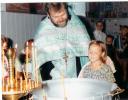 This is a shot of my adopted daughter being baptized into the Orthodox Church at an orphanage in Ukraine. The mass baptism is an annual event at orphanges and a fond memory for my now 17-year old.
This is a shot of my adopted daughter being baptized into the Orthodox Church at an orphanage in Ukraine. The mass baptism is an annual event at orphanges and a fond memory for my now 17-year old.
But it is also the last contact she had with the church that is synonymous with Ukrainian culture. I spent two months in this fascinating country and as someone who had read about and already attended many Orthodox liturgies in my hometown, I was excited to have the privilege of visiting some of the most sacred sites in the Orthodox Church.
I will always cherish the memory of going to the Monastery of the Caves and St. Mikhail’s Monastery in Kyiv, and attending daily liturgy at the Church of the Transfiguration in Odessa.
But it was disappointing to see that in orphanages and other rescue missions, Orthodox Christians were nowhere to be seen. I’ve heard the reasons for this: lack of funding, an overwhelming burden that makes it impossible to help so many in need, the years of opression, and the explanation that evangelicals are able to do it because they’re backed by well funded ministries.
These may be true to some extent, but the fact is that millions of dollars are being spent to restore Orthodox temples and new churches are dotting the landscape in every region, so pleading poverty is not convincing.
I know of four missionaries who serve my daughter’s old orphanage full-time, along with many others who visit regularly. One of the full-time missionaries is a Southern Baptist who’s been there since the Soviet breakup, there’s a young woman from a non-denominational church, and a Presbyterian couple that has moved to Ukraine permanently to minister to these abandoned children.
Ukraine is indeed missionaried to death. When we arrived at the airport in Kyiv we ran into a team of 40 para-church volunteers doing short term work at an orphanage. It is unfair to dismiss them as do-gooders who are just going to spread the good news. In my experience, I found them to be deeply committed individuals and families who are seeking to share the love of Christ in word and deed.
The orphans take notice of this. My older daughter spent 11 years in the orphanage and her Orthodox baptism is only a cheerful memory. She has absolutely no desire to seek out Orthodox Christians in America. The only Christianity she ever learned about was taught by Protestant evangelicals who have to continually raise money from individuals (not well funded ministries) to keep going.
More importantly, the only Christian love she saw in action was by evangelicals, both American and Ukrainian. I think most Orthodox leaders would agree that the overall lack of commitment to outreach has been a problem and that it is beginning to improve.
Yet when I see the discussion that takes place on blogs and in Orthodox broadcasting, very little seems to be devoted to recognizing and remedying this glaring weakness. Is this an inherent weakness of a Church that takes such justifiable pride in its beautiful liturgy, but fails, or refuses to see what is happening outside its walls?
Now that I’ve been taking a harsh inventory of my fellow evangelicals for the past week I thought it was fair to raise an issue that has never been satisfactorily resolved for me.




